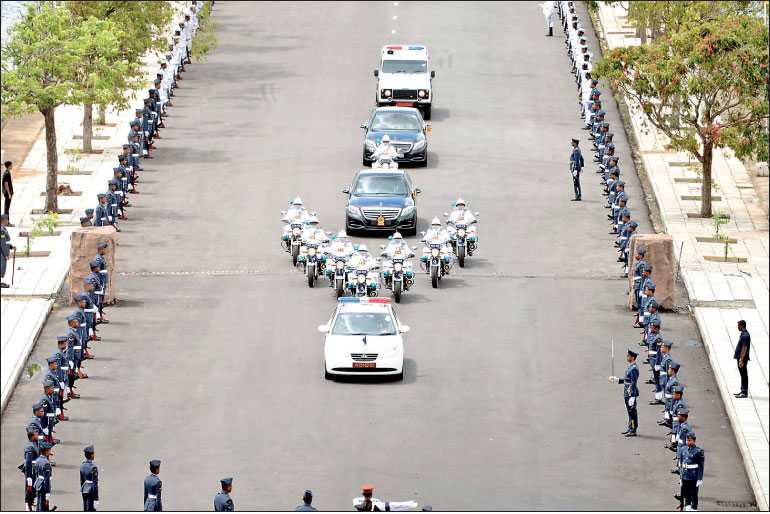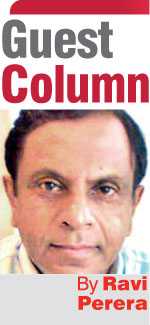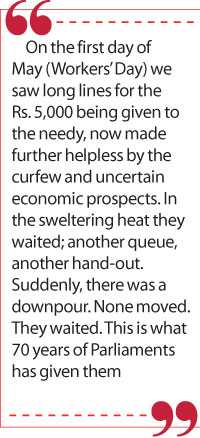Wednesday Feb 18, 2026
Wednesday Feb 18, 2026
Wednesday, 6 May 2020 00:18 - - {{hitsCtrl.values.hits}}

On the basis of our post-independence history, can we seriously contend that in the hands of our parliamentarians, public money is well managed? Nearly everyone accepts that for the ambitious, getting elected has become the path to fame and fortune in this country today; and that is not by performing public service – Pic by Shehan Gunasekara
“For forms of government let fools contest, whatever is best administered is best. For modes of faith let graceless zealots fight, his can’t be wrong whose life is in the right” – Alexander Pope
 We go round a mulberry bush, following one illusion after another, endlessly going, but reaching nowhere, prisoners of our own delusions.
We go round a mulberry bush, following one illusion after another, endlessly going, but reaching nowhere, prisoners of our own delusions.
Every now and then, to the polling booth we go, voting for a new president, parliament or a provincial government member. The victors celebrate, the defeated are damned, old projects thrown out, new projects carrying catchy titles announced, some are launched with fanfare, religious blessings invoked, hope is renewed.
Local touches notwithstanding, the scheme overall is a colonial inheritance, and, on account of the franchise, we can change our governments, peacefully, by majority wish, just like in England!
Very fundamental to the parliamentary system is the concept of the control of public finances by the (people’s) representatives. Not only the integrity of public funds, but also investment, development and overall progress, are more or less in the hands of our elected parliamentarians (whose majority go to form the government). From 1948 we had Parliaments, and from 1978 a President as well. In 1948, one US Dollar equalled about three Sri Lankan Rupees. Today it is nearly Rs. 200, down by more than 70 times! As a comparison, the Indian Rupee was less powerful than our rupee in 1947, a US Dollar fetched about Indian Rs. 4 then. Today it is approximately Indian Rs. 76 for a US Dollar.
Sri Lanka is deeply indebted
Sri Lanka is hugely in debt, unable to balance its budget without further borrowings. As a deeply indebted country we are ranked among the most vulnerable (earnings insufficient to service the loans). When contrasted to a resurgent Asia, there is hardly an industrial base in the country save for the most basic; value adding is only minimal, services indifferent.
Even among under-developed countries, Sri Lanka is known as a provider of cheap labour, low skills, drivers, housemaids and such like. No country wants to give a Visitor Visa to a Sri Lankan, without subjecting the applicant to a most humiliating screening.
Our economy has been growing at a mediocre 3-4% for years, not the kind of breakthrough rate that the South-East Asian countries sustained on their remarkable economic rise two to three decades back. Even India, carrying much heavier burdens, is growing at almost double our rate. The coronavirus is expected to result in a substantial contraction of the economy.
 Parliamentarians and public money
Parliamentarians and public money
On the basis of our post-independence history, can we seriously contend that in the hands of our parliamentarians, public money is well managed? Nearly everyone accepts that for the ambitious, getting elected has become the path to fame and fortune in this country today; and that is not by performing public service.
Parliamentarians, having control of the public purse, have denied themselves nothing; bungalows, cars, servants, medical facilities overseas, very regular junkets in the most expensive countries, being some of the more visible benefits.
No sooner he was able to (under the restrictions introduced by the new amendment (19) to the Constitution) the newly-elected President dissolved the sitting Parliament and called for Parliamentary Elections.
The Constitution mandated delay in constituting a new Parliament was pointless, only prolonging a lame-duck UNP Government, the obvious lack of public support had taken the wind out of its sails. At the Mid-November (2019) Presidential Elections Gotabaya Rajapaksa was elected with an overwhelming majority, underlining an unequivocal withdrawal of the mandate of the then Government.
This was not an unexpected reversal, several prior elections had given a dire warning of the voter’s mood to the UNP, the then ruling party. The warnings were to no avail, the emptiness of the farce was not of appearance, but of its essence.
The infamous bond scam
In its many manifestations, the infamous bond scam was perhaps a nadir in the concept of accountability with public funds.
For an economy, the integrity of its sovereign bonds is of the highest importance. The bond dealers, particularly in underdeveloped markets, operate in a murky world; wheeler dealing, buying information, fixing prices; oleaginous, corrupting, slithering all over.
For a bond dealer, to see his father-in-law ensconced at the head of the Central Bank, would be scarcely believable, a dream come true. Not only did this happen in Sri Lanka; the manoeuvres by a conniving political establishment, prior and post scam (to facilitate, and when found out, to confuse and obscure) perhaps was one of the darkest chapters of our parliamentary system. In the minds of many, some who carried the most onerous responsibilities for the public, were the most complicit.
Rising corruption
We are not for a moment suggesting that it is only the previous UNP Government’s handling of financial matters that leave much to be desired. Going by public perception, corruption, in its broader sense, is deeply entrenched in every aspect of our society.
Credible public records, including the Hansard, bear evidence of its widespread prevalence in public life from the time of independence or perhaps even before. But since about 1980s, the level of corruption appears to have risen several fold, even gaining a tacit legitimacy; “I am a businessman after all” becoming a common phrase, an acceptable excuse for bribery.
Today, nearly every government procurement/contract is suspect; the power sector, highways, medical services said to be particularly sleazy. Even the doctors have fallen, in the payroll of pharmaceutical companies. Needless to say, in addition to undermining the very foundations of a country, corruption also adds huge, unnecessary costs, to a public project. A poor country, already in an inescapable debt trap, is further squeezed.
Parliament and elections
If the results of the Presidential Elections (November 2019) were to be considered electorate wise, the United National Party would have lost nearly all the seats it holds in Parliament.
After such an emphatic defeat, the UNP, although yet commanding a majority in Parliament, had no moral basis to decide on behalf of the people. It therefore ceded control of the Government to the SLPP (Gotabaya Rajapaksa’s party), commanding less numbers in parliament.
The date fixed for elections for a new Parliament was only a few weeks away, when an unprecedented crisis burst on the entire world in the form of COVID-19. Not only in Sri Lanka, the world over, scheduled events came to a halt. Here in Sri Lanka, we now have a situation where the old Parliament is dissolved and a definite date cannot be fixed for an election to vote in a new parliament. A manmade constitution cannot provide for every conceivable contingency, the vexing situation we face is an example of such a lacuna.
Two approaches
Apparently, there are two ways to approach the problem. First, taking to account the extraordinary emergency facing us, continue with whatever administrative structure we have until an election can be held, which is likely a matter of weeks rather than months. Those who argue for the second method say that the dissolved Parliament must be recalled, particularly as public funds are being used and such expenses must be before the Parliament.
Alexander Pope thought only fools will argue about forms of government, what is administered well is best.
Learned writers have pointed out that the President may dissolve Parliament in three situations. Firstly, at the end of its legitimate term of five years. Secondly, six months before the end of a Parliament’s term (as in the present case) and thirdly, if two-thirds of the members of the Parliament request its dissolution.
An interesting question would arise in the first situation (where a parliament has ended its legitimate term) and a similar virus were to attack, before an election could be held. Could the president then recall a parliament whose term (mandate) has lapsed?
And even more piquant situation could arise where two thirds of a Parliament, by signed petition, requests its dissolution.
Let us assume that this most unlikely action is a result of an epiphany; members, taking a “truth potion” in their subsidised canteen, coming to the realisation that not only are they incompetent in public accounts, but while at it, are also dishonest.
Now, being honest men (a result of the potion!) two thirds demand that the Parliament be dissolved and they be released from further temptation. Then, after an election is declared to constitute a new Parliament, the damn virus attacks! Is the President to now recall a self -confessed house of incompetents and crooks? Can he will an unwilling Parliament to sit?
On the first day of May (Workers’ Day) our TVs focused on the long lines for the Rs. 5,000 being given to the needy, now made further helpless by the curfew and uncertain economic prospects. In the sweltering heat they waited; another queue, another hand-out. Suddenly, there was a downpour. None moved. They waited.
This is what 70 years of Parliaments has given them.